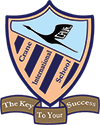Key Stage 3 is typically for learners aged 11-14years. On the pursuit of the Cambridge Assessment International Education Curriculum, it sets clear learning objectives for the first three years of Key Stage 2 education (Year 4 to 6), working in either set or mixed ability groups. It gives a wide range of different learning process, developing the knowledge, skills and practices that will lead to Academic Success, Life-long learning, Contribution to own society and Contribution to global society.
English
Key Stage 3 English enables learners to communicate confidently and effectively and to develop the skills to respond to a range of information, media and texts with understanding and enjoyment. The curriculum framework develops learners’ speaking, listening, reading and writing skills in English. Learners who follow this framework will develop their English language competency based on a curriculum designed to be successful in any culture and to promote cross-cultural understanding.
English Literature
English Literature aims to engage students in the study of literary texts of personal, cultural, social and aesthetic value. Reading through literary genres, such as Prose Fictions, Short Stories, Drama and Poetry, students learn about ideas and viewpoints concerning events, issues and characters that are expressed by authors in differing texts. Experiencing social and artistic value, they learn to value and draw upon historical, social and cultural contexts in various ways: Responding to Literature, Examining Literature and Creating Literature.
Mathematics
The curriculum framework explores six content areas: Number, Algebra, Geometry, Measure, Handling Data and Problem Solving. The first five content areas are all underpinned by problem solving, which provides a structure for the application of mathematical skills. Mental strategies are also an important part of the number content. The curriculum focuses on principles, patterns, systems, functions and relationships, so that learners apply their mathematical knowledge and develop a holistic understanding of the subject.
Science
This curriculum framework covers four content areas: scientific enquiry, biology, chemistry and physics. Scientific enquiry is about considering ideas, evaluating evidence, planning investigative work, and recording and analysing data. The scientific enquiry objectives underpin biology, chemistry and physics, which focus on developing confidence and interest in scientific knowledge. Environmental awareness and some history of science are also part of the curriculum.
History
This curriculum covers three distinctive timelines for Key Stage 2. Each year is split into three content areas – Ruling, Living and Working, and Moving and Travelling. This allows the students to gain a full knowledge of the timeline through these different approaches. They become historians, and begin to develop a new set of skills; interpretation, thinking and historical analysis. They begin to interpret sources and develop their own independent opinions to understand the current processes through past events.
Geography
Geography is unique in bridging the social sciences (human geography) with the natural sciences (physical geography). Human geography concerns the understanding of the dynamics of cultures, societies and economies, and physical geography concerns the understanding of the dynamics of physical landscapes and the environment. Each course is divided between Year 7 to 9 and helps students to develop an in depth understanding of the world we live in- physically, socially and culturally.
Global Perspectives
One of the key points of Cambridge Global Perspectives is metacognition, which refers to students’ awareness of how they have deepened and strengthened their ability to learn. Metacognition is critical in all subjects and used across learning areas; it is about how students reflect on and evaluate their own learning, how they have engaged with others, how their thinking has evolved. This offers students a 360º view of themselves as a learner as well as other people’s points of view and feedback from teachers.
Physical Education
Physical Education is taken in a 45-minute period class, twice a week. Students participate in individual sports, team sports, lifetime sports and physical fitness activities. Ongoing personal fitness profiles are developed as students assess their fitness throughout the year.
Exploratory
At the CISM , Key Stage 2, Exploratory Classes are designed for students to explore Art and Music. In Music, Year 7. 8 and 9 students get to choose a study between Band, Choir, or Strings.
An Optional Language: (Myanmar/Chinese/ French)
As part of the regular curriculum, Myanmar/ Mandarin / French classes are conducted 2 periods a week with emphasis on both receptive and productive skills. Consequently, being proficient in one’s mother tongue is an indicator for later academic success. It also provides students with a deeper inter-cultural awareness and engages them in the language, literature and culture of their home country.
Assessment
Key Stage 3 assessments are a test of a student’s knowledge of Core Learning Goals contained in certain course content areas. The tests will be given quarterly after the student completes a course containing the Core Learning Goals every 9 weeks of teaching and learning at CISM. Following these tests, Report Cards are given which accurately reflect the grades and progress of each individual student. Parents, students and teachers meet to discuss progress during regular Open Day Conferences, which are arranged at the end of each Semester.
| A + | 90- 100% |
| A | 80- 89% |
| B | 70-79% |
| C | 60-69% |
| D | 50-59% |
| F | Below 50% |
Key Stage 3 builds on the foundations developed in Key Stage 2, and offers learners a 3 year preparatory course to take part in the internationally recognized Cambridge Lower Secondary Checkpoint Exams at the end of Lower Secondary.

